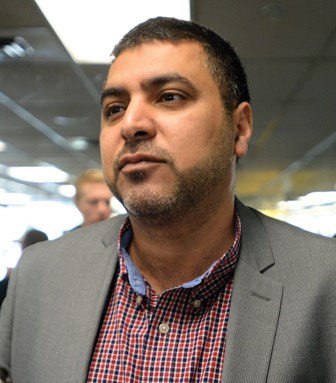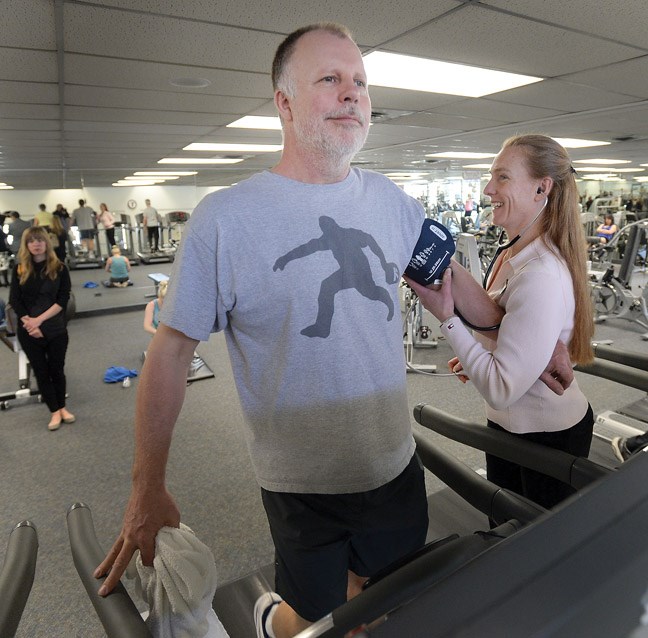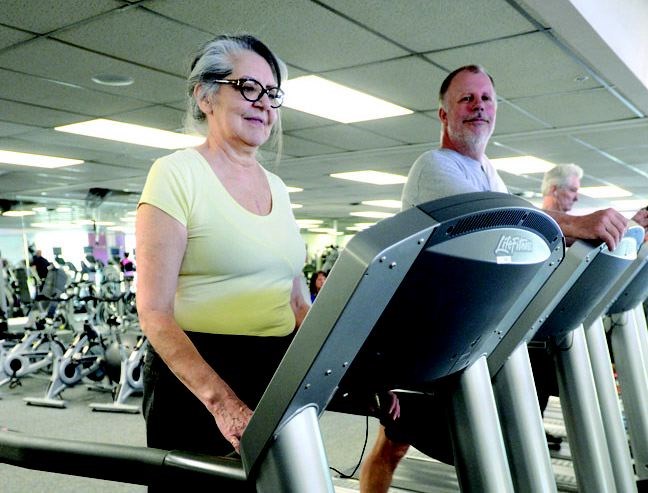Milly Saville keeps a slow pace on the treadmill. To her left, another participant in her cardiac class is having his heart rate monitored.
She's three weeks into the eight-week program and the 64-year-old is used to the constant attention and guidance as she recovers from a mitral valve replacement in September.
"It's been very liberating because I felt so disabled," says Saville.
The Prince George Cardiac and Pulmonary Rehabilitation Program launched in February and is a team approach to build better lifestyles - and outcomes - for those who have heart and lung problems.
The partnership between the Northern and Rural Cohort of the UBC Department of Physical Therapy, Northern Health, and the YMCA of Northern BC puts an exercise physiologist, a physiotherapist, and physical therapy students in a room with patients at the YMCA.
Saville is one of 18 cardiac patients. The pulmonary program has between six and eight participants but each has a rolling intake as physicians refer candidates. Participants pay a $10 administrative fee - a rate that's also offered for family members who want to work out at the YMCA while the patient is in class.
"I'm excited because it's so individualized. They let you explore how much more you can do," says Saville, but also pull you back when you push too hard.
"I'm extremely motivated," says Saville, adding it helps knowing medical professionals can guide her so she's making good choices.
Without the program, she would have been more tentative with her recovery, Saville says.
Northern Health medical lead for cardiac services and a cardiologist says the group component is essential.
"It's when you do it with a group then you get the motivation part," says Dr. Haidar Hadi.
"The cardiac program is just the beginning of healthy lifestyle after you've had intervention. Eight weeks is not going to make you healthier. It has to be your lifestyle. It's probably as important or even more important than medications."
The education component, after the exercises, is equally important.
"Following the exercise in this room we conduct education classes regarding various risk factor modifications and lifestyle behaviours to prevent further injury and adopt lifelong healthy behaviours," says Robin Roots, the coordinator of UBC's Northern and Rural Cohort.
Many patients, like Saville, struggle with that return to everyday activity.
"We hope to see quite significant chances in their aerobic capacity, their ability participate and function in society, return to work in many cases."
Hadi says the program fills a gap in Prince George. While Northern Health operates a Cardiac Rehabilitation Program at NORTH Clinic, it doesn't have a physical component.
The new program is complementary to the existing program.
"It's almost like a one-stop shop after you've had an intervention whereby you get exercise, you get education."

The genesis of the program goes back to a previous physiotherapist at the YMCA who offered a similar program years ago. But, she retired and the program went with her.
"It was not supported by any organization, I think it relied on the motivation of one person," says Haldi, adding the key ingredient to this set-up is the collaboration between several organizations.
"We learned from that lesson is that really we need to have the tools in place."
It's important to capture patients soon after their heart attacks or medical interventions, which Hadi says are often "life-changing" for them.
"They are so motivated and we want to capture that moment, really not to have a gap... We want this to be an immediate continuous process after intervention."
That will also mean patients are closely monitored, so if other medical problems crop up, they can be addressed immediately.
"The idea is this will reduce people having events and needing to go to the hospital for intervention."
Every year in the Prince George area, more than 400 new cases of cardiovascular disease and 350 new cases of chronic obstructive pulmonary disease are diagnosed. In 2015, almost 300 patients were admitted to UHNBC for acute coronary syndromes, the program press release said.
For Saville, the promise of the program gave her a different outlook.
"I wasn't sure when I'd feel normal again," Saville said.
She's made a goal with her granddaughter to hike the Grouse Grind by next summer, but more generally she sees a future where she can "be healthy and strong and able to do work again."




